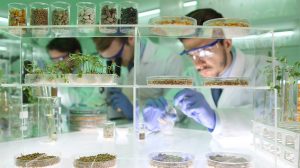Blast
1. (Science: biology, suffix) a suffix or terminal formative, used principally in biological terms, and signifying growth or formation. An immature precursor cell of the type indicated by the preceding word, for example; bioblast, epiblast, mesoblast, etc.
2. A violent gust of wind. A forcible stream of air from an orifice, as from a bellows, the mouth, etc. Hence: The continuous blowing to which one charge of ore or metal is subjected in a furnace; as, to melt so many tons of iron at a blast.
3. The terms hot blast and cold blast are employed to designate whether the current is heated or not heated before entering the furnace. A blast furnace is said to be in blast while it is in operation, and out of blast when not in use.
4. (Science: veterinary) a flatulent disease of sheep.
See: blast cell, blastema.
Origin: g. Blastos, germ
Dictionary > Blast
You will also like...

Homeostatic Mechanisms and Cellular Communication
Homeostasis is the relatively stable conditions of the internal environment that result from compensatory regulatory res..

Regulation of Biological Systems
Regulation of Biological Systems tutorials are focused on the modulation of biological systems from cell to population l..

Freshwater Lentic Communities & Animals
This tutorial looks at some of the communities in freshwater lentic habitats. For instance, symbiosis occurs in a commun..

Ecological Research: Measuring & Analysis
This lesson is about the methods used for ecological research, such as quadrat and transect sampling, canopy fogging, an..

Respiration
The human respiratory system is an efficient system of inspiring and expiring respiratory gases. This tutorial provides ..

Role of Golgi Apparatus & Endoplasmic Reticulum in Protein Synthesis
The endoplasmic reticulum and Golgi apparatus are the organelles involved in the translation step of protein synthesis a..

